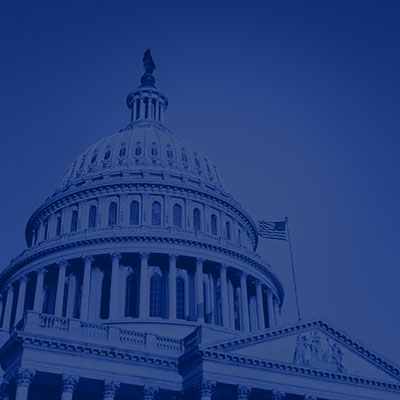Published: May 7, 2021

Operations research, analytics, data science, and other related disciplines enable individuals and organizations to transform data into insights that facilitate better, more informed decision-making in order to save lives, save money, and solve problems.
And in no place is informed decision-making more important than at the highest levels within the U.S. government, where every day policymakers are making decisions and shaping policy that will impact our day-to-day lives.
But how can we ensure that the individuals making these important decisions have the tools or awareness they need? By connecting them with resources and people who are knowledgeable about O.R. and analytics.
Over the past several years, the INFORMS advocacy program has focused on elevating the work and expertise of INFORMS members and, positioning them as subject matter experts in the national media and the policy ecosystem surrounding the federal government in Washington, DC.
As part of this ongoing effort, INFORMS collaborates with other professional associations and societies to extend its reach and impact. This includes the American Association for the Advancement of Science (AAAS), whose Science & Technology Policy Fellowships, known as the STPF program, provide opportunities to outstanding scientists and engineers to learn first-hand about policymaking while contributing their knowledge and analytical skills to the federal policymaking process.
For this episode I am pleased to welcome two fellows in the STPF program, Rachel Levy, a Science and Engineering Fellow in the Senate sponsored by the American Mathematical Society, and Regina Pope-Ford, a AAAS Science and Technology Policy Fellow at the National Science Foundation in the Engineering Directorate’s Engineering Education and Centers Division.
Mathematical and statistical modeling happens every day in the government. Every time an idea is proposed, it is critical to think about the cost, logistics, and the ripple effects. Things you might forget to even imagine are going to be important after legislation is passed or a program begins. Operations research, statistics, and mathematical modeling prepare us to weight priorities, make assumptions so we can get a handle on real messy problems, and think about equitable solutions to some of the toughest national and international problems. Then when we’re done, we’ve got to communicate ideas in ways that everyone can understand.
Interviewed this episode:

Rachel Levy, Regina Pope-Ford
Science and Engineering Fellow in the Senate sponsored by the American Mathematical Society, AAAS Science and Technology Policy Fellow at the National Science Foundation in the Engineering Directorate's Engineering Education and Centers Division
Rachel Levy is an American mathematician and blogger. She currently serves as the inaugural Executive Director of the North Carolina State University Data Science Academy. She was a 2020-21 AAAS Science and Technology Policy Fellow, serving in the United States Senate and sponsored by the American Mathematical Society. From 2018-2020 she served as deputy executive director of the Mathematical Association of America(2018-2020). As a faculty member at Harvey Mudd College from 2007-2019 her research was in applied mathematics, including the mathematical modeling of thin films, and the applications of fluid mechanics to biology. This work was funded by The National Science Foundation, Research Corporation, Howard Hughes Medical Institute, and US Office of Naval Research.
She now focuses on mathematics education, data science, and undergraduate mathematics research. She served as vice president for education of the Society for Industrial and Applied Mathematics (SIAM), and as editor-in-chief of SIAM Undergraduate Research Online (SIURO), an online publication of SIAM for undergraduate research in applied mathematics.
Regina Pope-Ford, PhD joins NSF as an American Association for the Advancement of Science (AAAS) Science & Technology Policy Fellow in the Division of Engineering Education and Centers, Engineering Education Research Program. Prior to joining NSF, she served as an Assistant Professor of Industrial & Manufacturing Engineering & Technology at Bradley University. Pope-Ford received her BS in Electrical Engineering from the University of Wisconsin – Madison, a MSEIE in Industrial Engineering from Arizona State University, and a PhD in Industrial and Systems Engineering from North Carolina A&T State University with a concentration in Human Factors. Her research includes the study of musculoskeletal disorders in dentistry, the impact of mobile technology on the musculoskeletal system of children ages 10-12, and the effects of shift work on nightshift workers. She has over 25 years of industry experience in design, test, analysis, and project management.
Pope-Ford has a passion for science, technology, engineering, and mathematics (STEM) and is an advocate for diversity and the inclusion of underrepresented groups in engineering and all sciences. This passion is demonstrated through her organization of summer enrichment camps for K-12 learners; her work as co-owner of Science & Math Innovators Inc. (SMI), a STEM nonprofit providing elementary and middle schoolers immersive STEM experiences; as well as her work to establish the West Side Alumni Foundation (WSAF) for West Side Leadership Academy in Gary, Indiana and service on the board of the Gary Alumni Pathway to Students (GAPS).
Episode Transcript
Contact us to request transcript.
Want to learn more? Check out the additional resources and links listed below for more information about what was discussed in the episode.
INFORMS Advocacy helps more than just policymakers, OR/MS Today
Why become a AAASS&T Policy Fellow?
Apply to become a AAAS Science & Technology Policy Fellow-Applications open June 1, 2021
